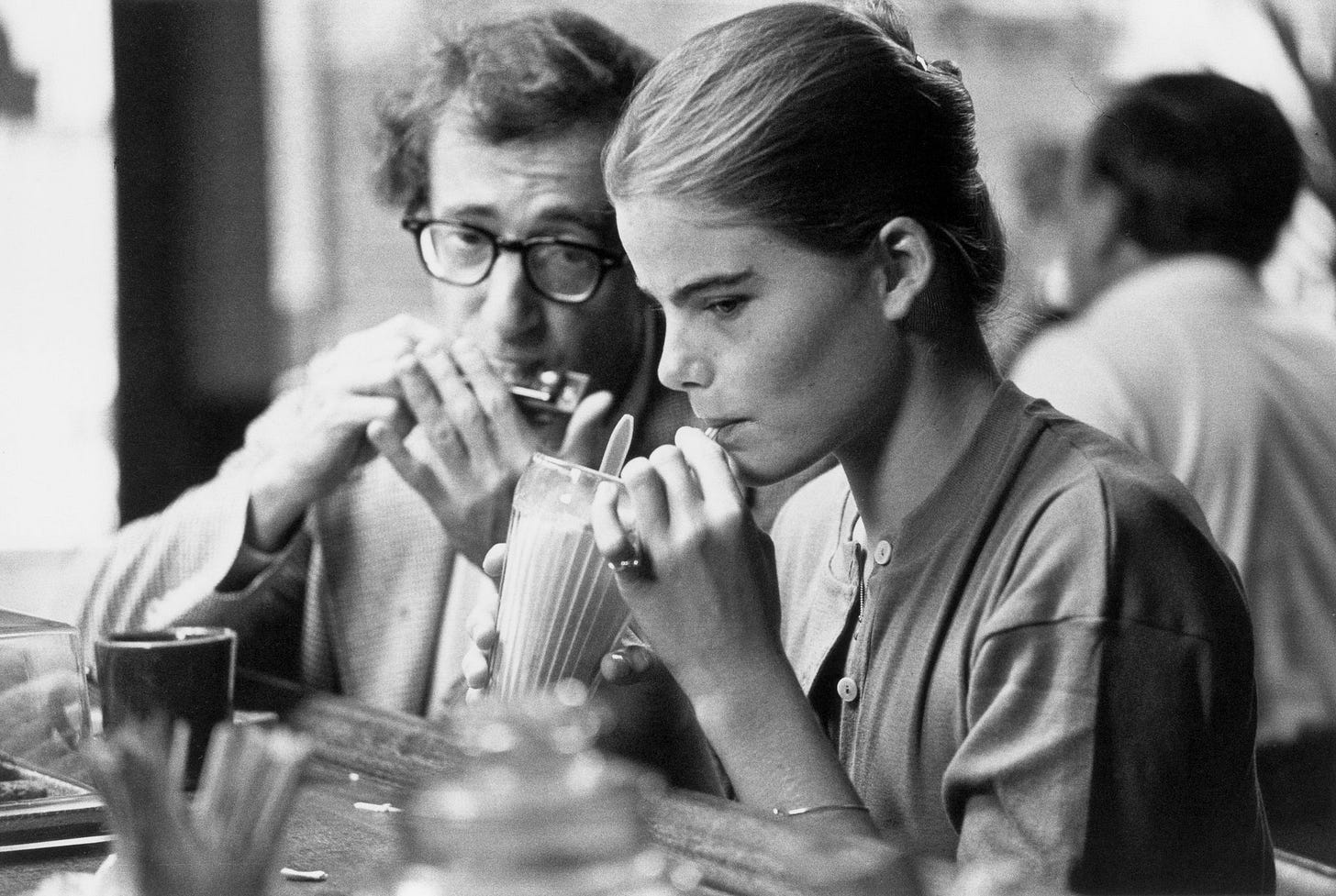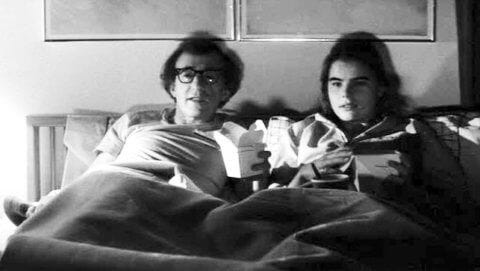First We Take 'Manhattan'
Woody or not? A look at how (mainly male) film critics reviewed Allen's 1979 movie--and affair with teen--as HBO series raises attention. Plus: apt music from The Police, the Stones and Neil Diamond.
As I noted when we met six weeks ago, I will be using the weekends for single pieces after wearing you out all week with shorter takes. Sometimes this will be an excerpt from my memoir-in-progress or on Sundays a career-spanning profile in music (so far, Leonard Cohen and Sam Cooke). Today: a Manhattan melodrama as we explore the reactions by leading critics back in 1979. Below, in contrast, we find a very tempted Sting resisting the urge for a (tantric?) hook up with a young student in this Police re-boot. But in the 1960s few rockers held back, as we will see down the page…Reminder: please subscribe if you have not, it’s (still) free.
All in on Allen, 1979
Episode two of the much-debated HBO series Allen v. Farrow, which aired last Sunday, re-visited Woody’s 1979 film Manhattan and its creepy portrayal of his character’s relationship with a 17-year-old Mariel Hemingway (who was sixteen at the time). My memory was that few critics—who were at that time overwhelmingly male—were bothered by that and, in fact, many declared the movie a masterpiece. Or so I recalled.
To check my memory, I decided to find out what leading reviewers did say about the film back then. Among the findings: Andrew Sarris of the Village Voice called it the only great American film of the entire decade. Time magazine put Allen on the cover and called him a "genius.” Their piece was titled (ouch) "Woody Allen Comes of Age." On the affair: “At the center of the film there is his relationship with a teen-age girl daringly presented in idealistic terms, an affair the old Allen would have made a guilty joke about and passed quickly over.” Jack Kroll in Newsweek declared that the director’s "growth in every department is lovely to behold." And so on.
Here are excerpts from reviews by leading male critics along with critiques from, ahem, two well-known women. Note Vincent Canby's reference to Mariel as a "nymphet." Critics and film writers expressed few complaints, or moral reevaluation, about the Woody/Mariel pairing until very recently. For example, writing about romantic comedies in The New Yorker in 2007, David Denby said that Manhattan, along with Annie Hall, elevated the form “to a level of rueful sophistication never seen before or since.” Janet Maslin in the Times admitted that the affair might have come off as "sleazy”--but Mariel's performance saved it. It has regularly shown up on lists of the 100 greatest movies ever.
As recently as 2017, just before #MeToo caught on, Peter Bradshaw of The Guardian in his re-visit announced, “Allen is superb as the menopausal guy….Nothing has changed in how compelling and addictively watchable this film is.” Today a longtime NY Times columnist, Ginia Bellafante, who saw the film more than a dozen times in her teen years, now re-assesses: “It is not simply that so many of us were so besotted with the film for so long; it’s that we were perfectly content to look and see virtue.”
Now on to a few additional reviews from 1979. She was just seventeen—you know what I mean?
Vincent Canby, The New York Times
Manhattan is, of course, about love, or, more accurately, about relationships. Among those who are attempting to relate to Isaac Davis are Mary Wilke (Diane Keaton), a journalist who carries on like an Annie Hall who has been analyzed out of her shyness into the shape of an aggressively neurotic woman doomed to make a mess of things, and Tracy (Mariel Hemingway), a beautiful 17-year-old nymphet with a turned-down mouth and a trust in her 42-year-old lover, Isaac, that is also doomed...
Gary Arnold, The Washington Post
With Manhattan, a sparkling romance about the overspecialized anxieties of over-intellectualized New Yorkers, Woody Allen has bounced back from the sobriety of Interiors to an exhilarating new comic high….But Allen does his most convincing paternal action in the scenes with Hemingway's Tracy. Their liaison is played out with admirable sincerity and culminates in two wonderful parting scenes, unexpectedly beautiful bittersweet confrontations that establish Allen's new command of sentimental material. The second encounter, which also closes the film, is especially impressive.
Roger Ebert, Chicago Sun-Times
I'm most disturbed by the final scene between Woody and Mariel Hemingway. It's not really thought out; Allen hasn't found the line between the irony the scene needs and the sentiment he wants his character to feel...
And yet this is a very good movie. Woody Allen is…Woody, sublimely. Diane Keaton gives us a fresh and nicely edged New York intellectual. And Mariel Hemingway deserves some kind of special award for what's in some ways the most difficult role in the film. It wouldn't do, you see, for the love scenes between Woody and Mariel to feel awkward or to hint at cradle-snatching or an unhealthy interest on Woody's part in innocent young girls. But they don't feel that way: Hemingway's character has a certain grave intelligence, a quietly fierce pride, that, strangely enough, suggest that even at seventeen she's the one Woody should be thinking of during Gershwin's "Someone to Watch Over Me."
Gene Siskel, Chicago Daily News
Woody runs away from an uncomplicated but lovely relationship with a 17-year-old girl.
Charles Champlin, Los Angeles Times
Harder, harsher, crueler, deeper-going, more assertive but in the end no less life-affirming than Annie Hall.
And now, two women. I could not find what one of the few other female critics, Judith Crist, had to say at the time.
Pauline Kael, The New Yorker
What man is his forties except Woody Allen could pass off a predilection for teenagers as a quest for true values?
Joan Didion, The New York Review of Books
In fact the paradigm for the action in these recent Woody Allen movies is high school. The characters in Manhattan and Annie Hall and Interiors are, with one exception, presented as adults, as sentient men and women in the most productive years of their lives, but their concerns and conversations are those of clever children, “class brains,” acting out a yearbook fantasy of adult life. (The one exception is “Tracy,” the Mariel Hemingway part in Manhattan, another kind of adolescent fantasy. Tracy actually is a high-school senior, at the Dalton School, and has perfect skin, perfect wisdom, perfect sex, and no visible family.)….
The message that large numbers of people are getting from Manhattan and Interiors and Annie Hall is that this kind of emotional shopping around is the proper business of life’s better students, that adolescence can now extend to middle age.
And later: When Roger Ebert re-visited the film in 2001 he observed that the only criticism of the April-December relationship by reviewers of the film was that it was not very credible--because the two "seemed to have so little in common." He suggested that the main problem was that Mariel idealized Woody more than he idealized her. So it was good that they broke up--or maybe the pair should have stayed together, he concluded.
In any case: the movie did wonders in offering fresh exposure to Gershwin’s Rhapsody in Blue, so here’s a taste from Herbie Hancock with Dudamel….
Song Picks of the Day
As I’ve said, by the 1980s, male rockers chose to be—or had to be—a little more restrained in supporting rocking the cradle. But here are two classics of the 1960s mindset, from the Stones (who did not wish to check the ID of the girl, age 15) and Neil Diamond (who noted that the girl would “be a woman soon”). Of course we also experienced Gary Puckett’s “Young Girl” and the Lovin’ Spoonful’s “Younger Girl” (to name just two of maybe dozens). Of course, nothing new under the sun, witness Sonny Boy’s “Little Schoolgirl.” Then there were the role reversals with young men enticed by older women, e.g. “Maggie May” and the Police again with “Wrapped Around Your Finger.” Below, Mick in 1969 and then Neil, who at least didn’t sing it at The Last Waltz—but Tarantino did feature it in Pulp Fiction.
Greg Mitchell is the author of a dozen books, including the bestseller The Tunnels (on escapes under the Berlin Wall), the current The Beginning or the End (on MGM’s wild atomic bomb movie), and The Campaign of the Century (on Upton Sinclair’s left-wing race for governor of California), which was recently picked by the Wall St. Journal as one of five greatest books ever about an election. For nearly all of the 1970s he was the #2 editor at the legendary Crawdaddy. Later he served as longtime editor of Editor & Publisher magazine. He recently co-produced a film about Beethoven’s Ninth Symphony and now has written and directed his first feature, Atomic Cover-up, which will have its American premiere at a festival this spring.



